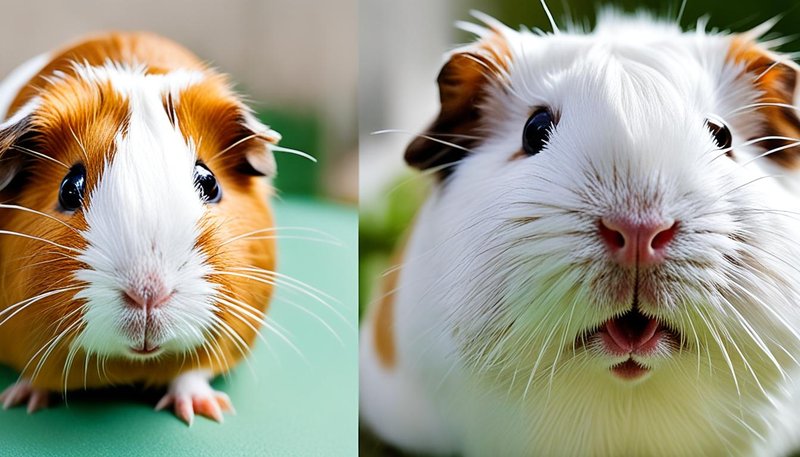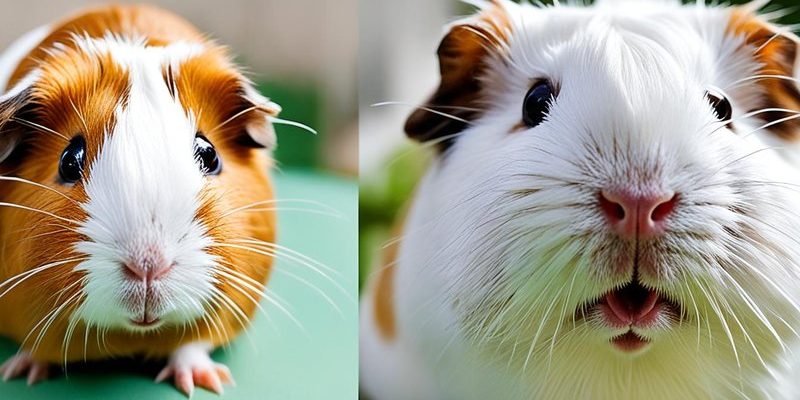
Caring for an Abyssinian guinea pig means being aware of their specific health needs. Think of it as a journey where you’ll learn to navigate the twists and turns of their care, helping them thrive and live a long, happy life. So, let’s dive into the common health concerns these adorable furballs might face and how you can prevent these issues before they arise.
Understanding Common Health Issues in Abyssinian Guinea Pigs
Before we get into prevention, it’s essential to recognize the health problems that can affect Abyssinian guinea pigs. Dental issues, respiratory infections, and skin problems are some of the most common concerns to be on the lookout for. The reason these issues pop up so frequently in guinea pigs is often linked to their unique anatomy and living conditions.
Unlike some pets, guinea pigs have continuously growing teeth. Without proper wear, these teeth can develop problems like overgrowth or malocclusion, leading to pain and difficulty eating. Respiratory issues may arise from poor ventilation in their living space or exposure to dust and strong scents. Lastly, skin problems can stem from an improper diet or lack of grooming, which is particularly important for Abyssinians due to their unique coat.
Recognizing these potential challenges early can make a world of difference. It’s not just about reacting when something’s wrong but being proactive in your pet care routine.
Preventing Dental Problems
Dental health is crucial for your Abyssinian guinea pig. Overgrown teeth can cause immense pain and lead to more severe health issues, which is why prevention is key. So, how do you keep their teeth in good shape?
1. Provide a Balanced Diet: Fresh hay is your guinea pig’s best friend. Long strands of hay help wear down their teeth naturally as they chew. It’s like providing them with a built-in toothbrush! You can also offer some leafy greens and commercial pellets formulated for guinea pigs, but remember to limit sugary treats like fruits.
2. Regular Check-ups: Just like we visit the dentist, your guinea pig should have dental check-ups with a vet. They can spot potential issues before they escalate.
3. Encourage Chewing: Offer chew toys made specifically for guinea pigs. These not only keep your furry friend entertained but also help wear down their teeth.
By staying on top of dental care, you can prevent a lot of pain and suffering down the road.
Signs of Dental Issues
You might be wondering, “How will I know if my guinea pig has dental problems?” Keep an eye out for:
– Difficulty eating or dropping food
– Excessive drooling
– Swollen jaw or face
– Changes in behavior, like decreased activity or becoming reclusive
If you notice any of these signs, a vet visit is a must!
Avoiding Respiratory Infections
Respiratory infections are another common concern for Abyssinian guinea pigs, and unfortunately, they can escalate quickly. But don’t worry! There are many ways to keep your piggy’s lungs clear and healthy.
1. Maintain Clean Living Conditions: A clean cage is a happy cage. Make sure to clean out their bedding regularly to avoid buildup of dust, waste, or mold. A dirty environment can be a breeding ground for bacteria.
2. Proper Ventilation: Ensure their living area is well-ventilated. If your guinea pig is in a closed space with limited airflow, it can easily develop respiratory issues.
3. Avoid Drafts and Temperature Extremes: Guinea pigs are sensitive to extreme temperatures. Keep them away from direct drafts from windows or vents. Ideally, their space should be kept between 65°F and 75°F.
With these tips, you can create a healthy environment for your guinea pig and keep those pesky respiratory infections at bay.
Signs of Respiratory Issues
How do you know if your little buddy is having breathing problems? Here are some signs to watch for:
– Coughing or sneezing
– Labored breathing or wheezing
– Nasal discharge
– Lethargy or reduced appetite
If you spot any of these symptoms, it’s time to call in the professionals for a check-up.
Addressing Skin Problems
Abyssinian guinea pigs have gorgeous coats, but they can also be prone to skin issues like fungal infections or mites. Keeping their coat clean and healthy is essential for their overall well-being.
1. Regular Grooming: These guinea pigs require regular grooming to keep their rosettes neat. Use a gentle brush designed for small animals. This not only helps with the coat but also allows you to spot any skin issues early on.
2. Healthy Diet: A balanced diet rich in vitamin C will keep their coats shiny and help prevent skin problems. Fresh veggies and quality pellets can make a difference.
3. Keep an Eye on Their Skin: Regularly check for any signs of irritation, redness, or excessive scratching. Any noticeable changes should prompt a vet visit.
A little grooming goes a long way toward maintaining beautiful fur and healthy skin.
Signs of Skin Issues
Keep these signs in mind when checking your guinea pig’s skin:
– Excessive scratching or biting at the skin
– Red patches or lesions
– Hair loss in patches
– Foul odors coming from the skin
If anything looks unusual, don’t hesitate to contact your vet.
Managing Weight and Obesity
Just like people, guinea pigs can struggle with obesity, which can lead to a slew of health problems. Keeping your Abyssinian guinea pig at a healthy weight is essential for their longevity and happiness.
1. Monitor Food Intake: Feeding your guinea pig a balanced diet is crucial. Be cautious with treats like pellets or fruits; they should only make up a small part of their overall consumption.
2. Encourage Activity: Provide plenty of space for your guinea pig to run and play. Exercise wheels or tunnels can keep them engaged and active.
3. Regular Weigh-ins: Weigh your guinea pig regularly to monitor their health. If you notice a sudden weight gain, it might be time to adjust their diet or activity level.
This proactive approach can ensure your furry friend stays fit and lives a longer, healthier life.
Signs of Obesity
Wondering if your guinea pig might be overweight? Look for these signs:
– Difficulty grooming themselves
– Reduced mobility or activity
– A noticeably rounder shape
If you’re concerned, consult your vet for personalized advice.
Choosing the Right Vet
Finding a vet who specializes in small animals is paramount for keeping your Abyssinian guinea pig healthy. Not all vets have the same experience with guinea pigs, so doing your research is essential.
1. Ask for Recommendations: Don’t hesitate to seek recommendations from local pet stores or online forums. Other pet owners can be a great resource.
2. Check Qualifications: Make sure your vet is experienced with guinea pigs and small animals. You can check their website or even call to ask about their experiences with cavies.
3. Trust Your Gut: When you visit, pay attention to how comfortable you and your guinea pig feel. A vet’s friendliness and willingness to answer questions can make a big difference.
Finding the right vet helps ensure your piggy gets the best care possible.
Caring for an Abyssinian guinea pig is a delightful adventure that brings joy and companionship. However, being aware of common health concerns and how to prevent them is vital to keeping your pet happy and healthy. From dental care to skin health and proper diet, small changes can lead to better outcomes.
To wrap it up, by providing a clean living environment, a balanced diet, and regular health check-ups, you can keep your furry friend feeling their best. Remember, prevention is always better than cure. Happy guinea pig parenting!

